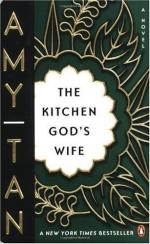|
This section contains 4,549 words (approx. 12 pages at 400 words per page) |

|
In the following essay, Caesar asserts that The Kitchen God's Wife is "an extremely complex postmodern literary novel that challenges the dominant narratives of contemporary American society, particularly our ideas of who matters and who does not."
If, as Jean-Francois Lyotard says, a "master narrative" is required to legitimate artistic expression, for the past thirty years the legitimizing narrative of mainstream American literary realism has been the quest for personal fulfillment. The increasingly stagnant, if not outright polluted, mainstream has produced novel after novel concerning the mid-life crises (and sometimes accompanying marital infidelities) of self-centered American men, with even the once rich Jewish and Southern literary traditions now given over to novels like Bernard Malamud's Dubin's Lives, Walker Percy's The Second Coming, and Reynolds Price's Blue Calhoun, all concerning a middle-aged (and in the first two instances, wealthy) white man's discontent. All are a far cry from...
|
This section contains 4,549 words (approx. 12 pages at 400 words per page) |

|




